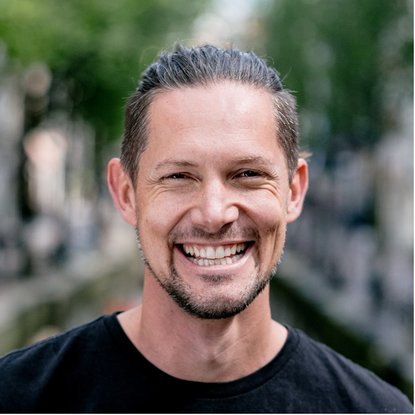Apply now for Amsterdam Circular batch #5!
Instead of investing in individual companies, the city is supporting entire value ecosystems—and the results are starting to speak for themselves. When Guy Vincent started running accelerator programs for circular startups with the City of Amsterdam, he discovered something fundamental was missing.
"After running half a dozen accelerator programs, I learned three things," reflects the Tech Trade Developer. "Collaboration is essential as circularity requires supply chain cooperation. Venture capital's unicorn-seeking strategies are not well-suited to circular startups. And the focus needs to shift from circular startups to circular value chains to unlock value. Which means the future of sustainable business might require rethinking everything we know about startup financing."
This revelation sparked chain financing through Amsterdam Circular, a groundbreaking accelerator, initiated by the City of Amsterdam with AMS Institute in 2023. Vincent explains:
“Amsterdam Circular is a circular chain accelerator (circulator) providing circular startup financing services. We offer a methodology that helps participants to form and fund value chains that unlock new value from circular revenue models, while helping the city to halve its raw material use by 2030.”
Guy Vincent
Program Lead Amsterdam Circular
The Traditional Funding Trap
The problem is painfully familiar. Promising circular startups emerge with solutions the planet desperately needs, only to collapse under traditional funding expectations. Dutch startup Pieter Pot, despite attracting 50,000 customers and €12 million in funding, declared bankruptcy in 2023. US-based Smallhold, valued at $90 million, followed suit in 2024.
"Traditional financing is risky because it often focuses on just one business," explains Elisa Achterberg, CEO and co-founder of CiSe Network and a mentor Vincent credits as instrumental to the program's success. Chain financing reduces that risk by spreading it across the entire supply chain, creating more security for investors."
A Revolutionary Approach
Chain financing represents a radical departure from conventional funding. Instead of backing individual startups, it supports entire value ecosystems. Vincent describes it as "funding that grows with your supply chain, not despite it."
Guy Vincent
The concept centers on creating a Minimum Viable Ecosystem (MVE) rather than just a Minimum Viable Product. This is where Vincent's partnership with Professor Murat Tarakci from the Rotterdam School of Management becomes crucial.
"The biggest hurdle in building an ecosystem approach is identifying and aligning partners," explains Tarakci. "An ecosystem view casts a wider net, including complementors who help create, capture, and deliver value."
Real-World Success Stories
The third edition showcases this approach in action. Take Grow It Away, which transforms hospitality food waste into compost through a network: Agriton provides fermentation bins, Oscar Circulair handles transportation, and the startup Compostandig equipment composts material before selling to farmers and clients like Soho House.
"Rather than writing pitch decks for financiers and investors, we found ourselves creating pitch decks to convince chain partners," notes Achterberg, highlighting how fundamentally different this approach is.
The current cohort includes Primal Soles, creating circular footwear from cork; Alex in Wonderland, delivering plant-based meals in reusable jars via electric cargo bikes; and Droppie, revolutionizing consumer recycling systems.
Global Impact Potential
Vincent's vision extends far beyond Amsterdam. "Existing financing options like debt and equity aren't fully accessible to circular startups; a new form of financing is needed for chain collaboration," he emphasizes.
Achterberg captures the program's significance: "I'm amazed by the visionary and systemic approach the City of Amsterdam is taking to change the system for a circular economy! Radical comes from 'radix'—roots—solving problems by the roots."
As Vincent reflects on this journey, his message is clear: "The biggest test is remembering that money is only a means, not the end. Circular startups need more than funds; they need ecosystem partners who share their goal of making the world a better place."
Amsterdam Circular isn't just funding startups. It's rewriting the playbook for sustainable innovation, and this is just the beginning.
Watch the mini-documentary on chain financing below.
Ready to join the circular revolution?
Be part of the change and visit the Amsterdam Circular page to learn more.

